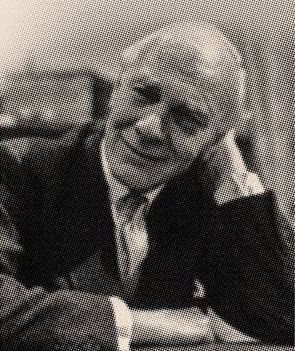1963
Our President in 1963/64 was:
Malcolm Muggeridge
He proposed the Toast to Sir Walter at our 56th Annual Dinner on Friday 6th March 1964 in The North British Hotel
Download the [transcript] or read the [bulletin]
Summary of the Speech:
Malcolm Muggeridge delivered a witty, self-deprecating, and insightful toast to Sir Walter Scott, blending personal anecdote, social critique, and literary commentary.
Structure and Key Themes
1. Personal Anecdotes and Humour
- Muggeridge opened with recollections of two earlier visits to Edinburgh—one as a university rectorial candidate, involving a surreal police escort, and another as chairman of a chaotic writers’ conference filled with eccentric personalities, including Trocchi and Henry Miller.
- He joked about his own profession, claiming journalists write more than they know and thus know less than they think, and admitted he was the first journalist to propose the toast.
2. Tribute to Hesketh Pearson
- Pearson’s biography of Scott formed the backbone of Muggeridge’s reflections.
- He praised Pearson’s rare quality of admiring his biographical subjects, in contrast to the prevailing cynicism of modern biographers.
3. Reappraising Scott’s Literary Legacy
- Initially prejudiced by his schoolboy readings, Muggeridge came to appreciate novels like The Antiquary, Old Mortality, Rob Roy, and Quentin Durward.
- He lamented the treatment of classics as “set books” and the damage that inflicted on young readers.
- He argued that Scott’s decline in popularity was due more to changing cultural contexts than intrinsic literary failure.
4. Commentary on Television Culture
- In a satirical riff, Muggeridge marvelled at how TV had reshaped culture and suggested that Scott’s popularity could now be judged by his adaptation to the small screen—Ivanhoe being a prime example.
5. Reflections on Changing Literary Taste
- Muggeridge contrasted Scott’s virtuous characters with the modern fascination with “anti-heroes” like Billy Liar and Jimmy Porter.
- He criticised the inversion of values in contemporary culture, where vice is seen as authenticity and virtue as hypocrisy.
6. Scott’s Romanticism and Political Views
- Muggeridge mused on Scott’s romanticised attachment to monarchy, Jacobitism, and Toryism.
- He defended Scott’s distrust of universal suffrage, warning of its abuses, and criticised modern democracy’s “ballot-box dictatorships.”
7. Final Character Assessment
- Despite Scott’s faults—snobbery, political conservatism—Muggeridge described him as a fundamentally warm, humane, generous, and admirable figure.
- He cited Scott’s impact on major thinkers like Tolstoy, Marx, and Balzac.
Notable and Interesting Points
- First journalist to give the toast, highlighting a cultural shift in public discourse.
- Television as a measure of popularity: Muggeridge humorously claimed that if Scott succeeded on TV, he had truly reached modern audiences.
- Sharp critique of modern literary values: He condemned the celebration of vice and the marginalisation of virtuous, heroic figures.
- Mockery of English snobbery and democratic pretensions: Especially vivid is the image of colonial parliaments being given ceremonial maces by Britain, only to use them in political violence.
Conclusion
Muggeridge’s toast was both a spirited defence of Sir Walter Scott and a wide-ranging meditation on literature, culture, media, and politics. Delivered with sharp wit and satirical insight, it captured Scott’s enduring value while critiquing the cultural forces that had conspired to obscure him.
Download the [transcript] or read the [bulletin]

Subsidiary Toasts
The toasts of “The Queen” and “The Royal Family” were duly honoured.
Thereafter Ian D. McIntosh, LL.D., proposed the toast of “The Imperial Forces” to which Air Vice-Marshal K. V. Garside, C.B., D.S.C., M.A., replied.
“The City of Edinburgh” was proposed by Sir John Bruce, C.B.E., T.D., F.R.C.S.E., and Treasurer Herbert A. Brechin, C.B.E., representing the Lord Provost, replied.
The health of the Chairman was proposed by Mr Allan Frazer..


